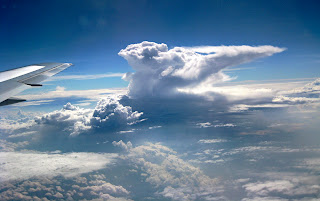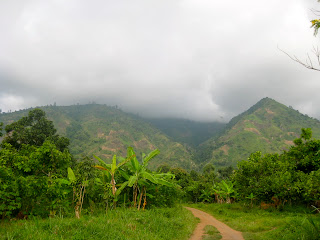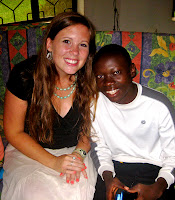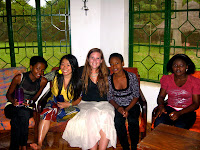UNICEF, once more
Since my last post, Olvie and I have:
-finished transcribing ALL the malnutrition patient information for 2011 into the new ledger book
-typed out step-by-step instructions for the admission, meds/ supplements, lab tests, daily procedures, and discharge of the SAM (severe acute malnutrition) kids
-re-done the UNICEF reports with the updated, more thorough/ correct data
-organized/ labeled a filing bin for the malnutrition records and reports
I am so glad to have that stuff done. It was quite entertaining seeing how many different ways they came up with to spell the same child’s name each time they entered them in the formula book. One of our personal favorites: honest aka harriet aka hornest. Another good one: marion aka maleon (again, that confusing r/l business). And one more: neverless aka everless.
We also enjoyed the “duty roaster for security officers” posted on the wall in the records room.
Picfare Primary School
One of the alumni (“Old Boys,” or “OBs” for short) of Christ school had invited Olvie and myself to come visit his primary school for chapel sometime. Kevin Barkovich, a missionary who was here with his family for 10 years and who started Christ school, wanted to come with us to see this school begun by his former students. The alumni had seen a need in the town of Picfare and started a primary school there a few years back. Kevin arranged for a couple of bodas to take us there. It was one of the craziest boda rides yet. The drivers maneuvered the huge mud pits in the road so well, sometimes trudging through them and other times off-roading for a bit. I don’t think I even got a drop of mud on my dress. They weaved in and among houses and through narrow passageways so skillfully, and we attracted a small crowd of children running after us.

We got there just in time for chapel. Perhaps one of my favorite memories of our time here is of those children singing for us. The “nursery” kids sang a few songs, then the rest of the elementary school kids sang some, and finally, they sang some altogether. Even the little ones were so in sync and had such beautiful, loud voices. I loved watching them dance and seeing even these tiny kids coming forward to sing their solos. It was so precious.
Olvie and I led chapel, and Kevin gave some encouragement to the teachers of the school before we left.
Health outreach

The In-Charge at the health center invited us to come on a community outreach one day (largely so they would have use of World Harvest’s vehicle). This 9 o’clock adventure began at 10:44. Jess drove the Nissan Patrol-- even with the 11 of us squeezed in there, it was still roomy compared to the crammed Ugandan matatu vans. The rest of the health staff climbed into the “ambulance,” and off we went. Ahh, the fresh (or should I say flesh?) aroma of a dozen sweaty bodies and petrol fumes, swirling together with the clouds of red dust from the road. The ambulance pulled into the Busunga health clinic, and one of the health workers hopped out and explained, “We are stopping for condoms to go with.” After that detour, we continued a bit further and stopped by a community pavillion-like structure. After the goat poop was swept up, the Nyahuka Health Center (NHC) staff set up for the outreach. Meanwhile, Jess, Olvie, and I walked up the hill and were met with a beautiful view of neighboring Democratic Republic of Congo.

People from the community just started gathering as the outreach began. There was a talk about the importance of HIV testing and perhaps about how to protect oneself (it was in Lubwisi, so I can’t be sure about details), then the staff filled out HIV testing cards for each person who came through the line. Each person then took their card over to the other station where the testing was being done. Knowing they would soon run out of the official HIV testing cards (100s of people were showing up), they asked if we would be willing to drive these 2 men back to Nyahuka to grab more.
On the way, one of the men asked Olvie for her number and if she would be his wife. He was very persistent, even after she rejected his proposals many times in many different ways. On our return to Busunga, he proposed to me and went on and on about how he wanted a wife. He turned out to be probably the creepiest guy we’ve interacted with so far. (He kept watching us the rest of the time at the outreach and a few days later found us on our way to the health center, saying he had been wanting to talk with us. I bluntly told him we didn’t want to talk with him or be around him and didn’t appreciate the way he was acting toward us. He hasn’t bothered us since.)
Back at the outreach, the staff seemed to have things under control and didn’t really have anything for us to do, so we entertained the droves of children gathered with coloring books, stickers and songs. They love stickers.
After 6 hours, the outreach came to an end. The staff had tested 248 people for HIV, and 4 turned out to be positive. HIV rates in this part of Uganda have historically been lower than the rest of the country, largely due to its geographical and cultural isolation. We fear there may be a sharp rise in the rates with the new incoming road and all that will bring along with it.
Pants
One day, on our way home from church, we ran into Arali, a man who sells clothes at the market. He said to us, “You are lost,” which means “we missed you/ you haven’t been around recently.” Olvie didn’t catch the meaning and said, “No, we’re not lost,” then I kind of whispered to her what he meant (I remembered one of our team members talking about the use of that phrase here earlier). Then she said, in a loud, excited voice, “We came by the market yesterday to see your pants (i.e. underwear), but couldn’t find you,” at which point we all tried to cover and say, “TROUSERS, TROUSERS!”
More observations
(I can’t remember for sure which things I’ve already noted in my previous posts, so if I repeat one, please forgive me)
-even boys and some men like nail polish here. Kids love to come over and paint their nails and can go through some “tutex” (what they call nail polish) like it’s their job.
-holding hands is very common and acceptable here-- girls w/ girls, boys w/ boys --it’s just a way of showing friendship.
-bras are rarely a part of female attire.
-thick winter jackets are worn even on days where it’s over 80 degrees out; boda drivers love them
-they are so many pregnant goats waddling around that look like they’re going to pop!
-kids frequently come to our door asking for “shedding”-- “shading,” i.e. coloring. They love to just sit and color for hours.
-hand shakes often end with a snap-- each person snaps the other’s middle finger in between their own middle finger and thumb. I’ve really come to enjoy this hand shake, especially now that I can do it; however, I have had several experiences where I went in for the snap and the other person didn’t, which made things momentarily awkward. It’s kind of like when you go to give someone a hug and realize they just wanted to shake your hand or give you a high five.
-the way to say “I’m hungry/ thirsty” in Lubwisi literally translates as: “Hunger/ thirst is grabbing me”
-people refer to each other as “this one” or “that one”-- it sounds very depersonalizing, but that is how you refer to even good friends.
-instead of putting your tooth under you pillow and awaiting a coin from the tooth fairy, if you lose a tooth here, you turn your back to your house, hike your tooth like a football between your legs onto your roof, and ask the lizard to bring you a new one. (In the old days, lizards were thought to have beautiful teeth.)
-we saw a little kid wearing Barack Obama briefs the other day. Haha.
-everything liquefies or molds VERY quickly here.
-music is often blasted from speakers in front of people’s shops. It’s kind of fun to hear music as you’re walking around town, but it’s miserable if you’re right by the speakers. I don’t know how the owners tolerate it.
-remember the whole Lubwisi r/l letter mix-up? Jess told us the story of one day at the health center when Travis asked a pregnant woman if she was “breeding.” Jess was kind of like, “Well, clearly she is breeding!” He was actually trying to ask her if she was bleeding and, knowing she would understand better if he switched the l for an r, he asked if she was breeding. haha. And, apparently, this r/l phenomenon afforded some good laughs when the big election was coming through town…
-when a guest of yours is leaving, you should “give them a push,” i.e. walk them out and go with them for a bit of their journey home. It is customary to stop before you have walked your visitor all the way home, to show them that you want them to return sometime (if you walk them all the way home, that indicates that you do not want them to visit again.)
-most of the ties that men wear are especially short.
-if you are parting ways with someone and want to say that you enjoyed your time together, you should say “nice time.” And feel free to repeat a few times-- the more the merrier.
-Banyoro people speak Runyoro. The word for “man” in Lubwisi, musasa, means “pain” in Runyoro.
-most of the cows here have huge sharp horns. They also seem to just love blocking traffic.
-heavy loads are generally are wrapped in fabric which is tied on top of the head so that it forms a sling-type carrier that holds the load behind the person’s back. Jerry cans are used for transporting and storing water. For carrying purposes, a piece of fabric is fed through the handle and tied on top of the head, such that the load is again behind the person’s back.
-Amy and Travis were telling us about a sign they came across in Kampala, and I thought I would share: “National Anti-Open Defecation Week”-- halting ground poopers one sign at a time I guess.
Dinners with friends
We have enjoyed sharing meals with friends in the last couple of weeks. One night, we ate with our friends Naomi, Susan, Paige, and Robert at Naomi’s house. They go to school across the road from us and are sweet kids. Naomi’s family moved to Kampala and left her behind to take care of the grandma who didn’t want to make the move. She is struggling to provide for the 2 of them and dealing with feelings of abandonment.
Anna, Jess, Olvie, and I brought part of the meal and had given Naomi some money to make the rest of it. We had a fun time hanging out together at their home and eating by kerosine light.
Another night, our friend and language instructor, Vincent, invited to his home for dinner. He and a friend had prepared g-nut (ground nut) sauce, bitter eggplant (small green and white eggplants) sauce, sombe (made from cassava leaves), sweet potatoes (white on the inside), and rice. LC I Chairman Christopher, Alex, Lilian, and baby Stephen joined us for dinner under their large tree (which Vincent himself planted as a child-- things grow so fast here). Alex and Vincent told us stories of how things used to be and of the beliefs and cultural traditions of their grandparents. It was a lovely evening, and we could see the stars so clearly on our walk home.
A couple of evenings ago, Olvie and I invited Jess, Anna, and Vincent over to ours for quesadillas. It is amazing how much more effort goes into everything here. While quesadillas are a fairly quick meal back home, here we had to make the flour tortillas, grate the cheese, soak the beans over night and then cook them for an hour and half, and make the salsa (brought by Anna and Jess, along with yummy guacamole). Vincent brought delicious g-nut sauce with cauliflower, which went well with our onion-bean quesadillas. After dinner, we showed him Photobooth on the computer, took some crazy pictures, and then looked at photos of family and friends. When we “gave him a push” and walked him out, we discovered some night blooming jasmine-- it smells so nice, but only at night as the flowers close up during the day.
Last night Anna and Jess treated Olvie and me to a delightful dinner at Julex, a small restaurant in town. If you call and order ahead of time, they can arrange to prepare fish and chips for your dinner-- we very much enjoyed those! It was a special night for the four of us, and sad to think it was our last night out together.
Hike to Nyahuka Falls
Last weekend Jess, Anna, Olvie, and I decided to hike to Nyahuka Falls, one of the two waterfalls in the area. We brought the Johnson’s black lab, Bhotu (“friend” in Lubwisi) along with us. The trailhead, if you can even call it that, was about a 40 min drive away.


We parked on the side of the road and headed up the trail, which wound up the mountain, weaving among homes and through plots of cocoa, coffee, vanilla, and beans. Not long into our hike, we came across a man carrying a cow leg and a tire, also making his way up the mountain. We apparently missed the turn off (looking at it later, I don’t know how we could have ever known where to turn without someone guiding us, it was so obscure). We kept climbing higher and higher, enjoying the view overlooking the valley and towns below. Finally, we asked again if we were going the right way, and a teenage boy who spoke English, an old man, and some other boys volunteered to guide us to the falls. The old man bush-whacked ahead of us, and the boys enjoyed watching our endeavors to climb through what had turned into thick virgin jungle. Since we had climbed too high up the mountain, we had to blaze our own trail across and down to the falls. We saw monkeys and huge hollow roots of trees that monkeys beat like drums to communicate with each other. We eventually reached the water and had to cross (there was a small waterfall, but we were still above the main falls). Our guides were very helpful in directing us across the stream. I did get wet up to my butt, however. At one point, we had to cross over water by walking on a thick horizontal vine, holding onto two other vines above. Finally, we made it to the main falls, though from a very different angle than we would have, had we taken the right path to begin with. Instead of looking up from the pool down below, we were on the other side and up near where the falls shot out over the cliff. As we could go no further, we had to hike back up and out of the gorge, and blaze some more trail back to the original path where we started. This was quite the adventure. I slipped several times and at one point decided I would be better off just squatting down and sliding down on my feet and butt. After passing underneath a low canopy of cocoa trees, we reached the actual path once more and made it back to our car. What a hike-- I’m glad we missed the turn-off from the trail so we could experience the jungle in that fascinating way.
 |
| vehicle loaded down with furniture spotted on our drive home from our hike |
-> I would highly recommend checking out Jess’ account of our hike on her blog (www.jessankney.wordpress.com -- “Jess of the Jungle”). I really enjoyed her perspective and story-telling of that adventure.
 |
| our feet during the hike, after crossing the stream |
 |
| our feet, post-hike |
Biking expedition
The day after our hike, Olvie and I decided to go on a bike ride. We pumped the tires on Anna and Jess’ bikes, adjusted the helmets, and embarked on an endeavor to bike the loop Anna had told us about. We started out down Batogo road, where we have run a few times, and kept an eye out for the mango trees marking the turn we were to take. The roads are so rutted and rocky and dusty and muddy all at the same time, that I feared for my life a few times (well, at least for my teeth…) For a significant stretch of our trek, the road was disrupted by huge mud puddles. For most of them, we had to dismount and walk our bikes through. Olvie fell once, but came away with only a bruised left hip bone, some small scrapes and plenty of mud caked on her. At one point we thought my bike had a flat back tire, but I figured there was nothing I could do about it till we got home. I did notice it got harder to pedal though. Once we turned onto the main road for the final leg of the loop, traffic increased, and I grew a bit concerned with the bodas (the boda drivers rarely feel confined to their proper lane, as the condition of the road often requires they weave back and forth to avoid major divots and potholes). My arms grew tired from trying to stabilize myself going over so much bumpy terrain. At last, we made it home, feeling very accomplished and relieved that nothing terrible had happened on that crazy ride. As we recovered from the hour and 15 minutes of surging adrenaline, we gave the bikes a good washing. I pumped the tire, and it didn’t seem to have a hole in it. I realized, though, that the back tire was not spinning well, so I flipped it over and adjusted the brakes, making sure there was no more mud caked on them. In the process, I discovered that the wheel itself had come lose from the frame of the bike on one side, which was the reason for it not spinning well! I was so thankful that it had held up until I made it home!

Cocoa
I may have mentioned this before, but cocoa is the main crop grown in this area (coffee used to be a major cash crop, until a blight wiped most of it out). Many family’s have a shamba (field) where they grow cocoa. Cocoa harvesting has been limited to the 15th and 30th of each month. Crop thievery was such a problem, especially as a family’s shamba may be far from their home, that the government set aside 2 days for harvesting. Under this system, anyone caught harvesting cocoa on any other day could be identified as a thief and on the two designated days, the families are in their shambas, harvesting themselves, and thereby preventing thievery for the most part just by being there. The cocoa is dried on tarp-like mats on the side of the road. The smell of the fermenting beans is one of the most putrid smells I’ve encountered. The aroma awaits us almost everyday on our way to the market or health center. It smells quite like vomit and almost makes me gag.
Field surveys
In the last couple of weeks, Olvie and I have started doing some key informant field surveys with Baguma Charles. We have been interviewing three people per community-- the LC I chairman of the village, a mother, and either a local health center worker, elder, or other person with a key role in the community. We have been asking questions about the community’s attitudes toward and behaviors concerning child nutrition, malnutrition, water, and diarrhea. We are trying to gather some preliminary qualitative data that can help Travis and Jess and the Ugandan staff at the Nyahuka Health Center to pinpoint some target areas to focus on and know the best way to go about community health initiatives in the area. Baguma has been a wonderful translator, cultural guide, boda driver for our excursions into remote villages, and friend. He was also a great help to us as we designed the interview questions with Travis and Jess.

The field surveys have been one of my favorite things we have done here. It has been really exciting to be a part of public health data collection in the field. It has also been good to just give our interviewees space to tell us what they know and shed some light on perspectives of their community.
 |
| Baguma took us right up to the DRC border |
 |
| In the river separating Uganda from the DRC! |
Other news
-Olvie and I tried our hand at homemade cheese (from our old milk that had separated). It turned out pretty well!
-We had a run-in with some impali ants yesterday. They have been going crazy on the path outside our house. Jess and I still had some crawling in our clothes when we got inside. They didn’t draw any blood on me, but they hurt!

































































